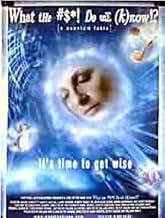CALIFICACIÓN DE IMDb
5.2/10
14 k
TU CALIFICACIÓN
La búsqueda de una fotógrafa de ficción para redescubrirse espiritualmente a sí misma se entremezcla con imágenes documentales de científicos y teólogos que discuten los aspectos filosóficos... Leer todoLa búsqueda de una fotógrafa de ficción para redescubrirse espiritualmente a sí misma se entremezcla con imágenes documentales de científicos y teólogos que discuten los aspectos filosóficos de la física cuántica.La búsqueda de una fotógrafa de ficción para redescubrirse espiritualmente a sí misma se entremezcla con imágenes documentales de científicos y teólogos que discuten los aspectos filosóficos de la física cuántica.
- Premios
- 2 premios ganados en total
James Langston Drake
- Groom
- (as Jame Drake)
Michele Mariana
- Tour Guide
- (as Michelle Mariana)
Argumento
¿Sabías que…?
- TriviaJohn Gorenfeld wrote in a September 2004 Salon article that David Albert, one of the interviewed experts in the film, feels he was duped and misrepresented as to the real purpose and agenda of the movie. "Albert, a professor at the Columbia University physics department, has accused the filmmakers of warping his ideas to fit a spiritual agenda. 'I don't think it's quite right to say I was "tricked" into appearing,' he said in a statement reposted by a critic on What the Bleep's Internet forum, 'but it is certainly the case that I was edited in such a way as to completely suppress my actual views about the matters the movie discusses. I am, indeed, profoundly unsympathetic to attempts at linking quantum mechanics with consciousness. Moreover, I explained all that, at great length, on camera, to the producers of the film ... Had I known that I would have been so radically misrepresented in the movie, I would certainly not have agreed to be filmed. I certainly do not subscribe to the 'Ramtha School on Enlightenment," whatever that is!' he finished. Albert provided Salon with an excerpt from a piece he's writing on the subject, in which he says, in part, 'I'm unwittingly made to sound as if (maybe) I endorse its thesis.' When told of Albert's complaints, [Meyer Gottlieb, president of the movie's distributor, Samuel Goldwyn Films] said, 'I certainly don't see it,' but acknowledged he's 'not into the science 100 percent.'"
- ErroresDepiction of quantum mechanics in the movie bears no resemblance to the real theory of that name. In particular, the common misconception that the "observer effect" is dependent upon a sapient, human observer is incorrect. If any object interacts with any other, and either requires information regarding the current state and properties of the other, then that constitutes an observation.
- Créditos curiososThe Scientists, Mystics and Scholars interviews herein were chosen based on the expertise in the subjects which they discussed. They do not necessarily agree with all viewpoints put forth in the film. Likewise the Filmmakers may not agree with all the viewpoints put forth by the Interviewees. Agreement is not necessary - thinking for one's self is.
- ConexionesFeatured in Brows Held High: Mr. Nobody and Living in Bad Faith (2015)
Opinión destacada
OK, first I'm going to tear down the "Columbus's ships" thing. I'm fairly certain the Caribbeans had some sort of seaworthy craft, such as rafts or canoes. From these, any normal human intelligence can extrapolate their concept of "boat" to include these ships. Also, where did the writer get this story? Source? Since it's not common knowledge, you need a source.
Next is the direction of time question. In Stephen Hawking's "A Brief History of Time," he talks about the 4 arrows of time accepted by the scientific community at large. While it is true that some fundamental (classical/Newtonian) physical laws don't care which direction time is going, many do. The arrow that I remember (it's been a while since I last read the book) is the thermodynamic arrow of time, which causes us to experience events in such a way that the entropy, or disorder, of the universe increases. For example, a cup falls off a table and breaks, not the other way around.
Ah, then the probability discussion. Yes, for subatomic particles like electrons and quarks, the probability wave is spread out enough that the particle can be in >1 place at a time. However, when you look at anything larger than these specks, the waves get exponentially more concentrated, so that a large (visible w/naked eye) object really has an infinitesimal probability of being in more than one state. So small is this probability that you would have to watch a "large" object say, a tennis ball, for more than the present age of the universe (15,000,000,000 years) for it to have an appreciable chance of doing anything strange.
Closely linked to my last paragraph is the talk about particles popping in and out of existence. The answer to "where do they go" is "they turn back into energy." This is what E=mc^2 means. In the "vacuum" of space, particle/antiparticle pairs of subatomic particles are constantly being created from random energy fluctuations, but these particles are existing on borrowed energy, which they very soon have to repay by annihilating with their mate.
Next is the water conversation. First of all, those pictures were of FROZEN water, which the narrator conveniently forgot to mention, only saying the jars were "left out overnight". Next, the claim that our bodies are 90% water is completely bogus. If that were true, there'd be no way we could so much as stand up. Instead: newborns have around 78%, 1-year-olds around 65%, adult men about 60%, and adult women around 55% (http://www.madsci.org/posts/archives/may2000/958588306.An.r.html).
This sheds doubt upon the rest of this "experiment."
The claim that if you only believe enough, you could walk on water is another seriously questionable one. If it's true, why didn't they show us? Tape someone walking on water. Even though you could fairly easily fake it with some video editing software, it'd still be a little more convincing than them simply telling us it's so. Using this "positive thinking" idea to then say that you create your own reality is equally flawed. Sure, I can very well believe that I live in a world inhabited by one-eyed, one-horned, flying, purple people-eaters, but that's irrelevant if the beings you interact with don't see the world this way.
And then the movie goes on to preach to us about God! How can a "scientific" movie propose to do this? Actually, I have a problem with that one guy proscribing what God is and what He isn't. Shouldn't that be up to the individual, thank you very much? Also in this part, one of the women commentators mentions that we have "antigravity." No, we don't. It's that simple.
Biology's not my thing, but there's a point where you just have to bring out a contradiction. One lady says that if you keep bombarding a cell with a certain chemical, the receptors on that cell will decrease. But soon after, a guy comes on and says that this same daily bombardment will cause the cell to produce a new cell when it divides that has MORE of the receptors. Contradiction. Oops.
I also have to comment on the guy who earlier on this board said this movie would appeal to anyone who's read "The Elegant Universe" by Brian Greene. I strongly disagree; I own and have read that book, and nowhere are its ideas remotely connected to this movie's ideas.
Lastly, I will agree with whoever said the movie is rather drawn out. Especially at the end. They just won't stop talking. They keep on going. Repeating the same stuff over and over. Which is what I'm doing for effect, if you couldn't figure that out.
Next is the direction of time question. In Stephen Hawking's "A Brief History of Time," he talks about the 4 arrows of time accepted by the scientific community at large. While it is true that some fundamental (classical/Newtonian) physical laws don't care which direction time is going, many do. The arrow that I remember (it's been a while since I last read the book) is the thermodynamic arrow of time, which causes us to experience events in such a way that the entropy, or disorder, of the universe increases. For example, a cup falls off a table and breaks, not the other way around.
Ah, then the probability discussion. Yes, for subatomic particles like electrons and quarks, the probability wave is spread out enough that the particle can be in >1 place at a time. However, when you look at anything larger than these specks, the waves get exponentially more concentrated, so that a large (visible w/naked eye) object really has an infinitesimal probability of being in more than one state. So small is this probability that you would have to watch a "large" object say, a tennis ball, for more than the present age of the universe (15,000,000,000 years) for it to have an appreciable chance of doing anything strange.
Closely linked to my last paragraph is the talk about particles popping in and out of existence. The answer to "where do they go" is "they turn back into energy." This is what E=mc^2 means. In the "vacuum" of space, particle/antiparticle pairs of subatomic particles are constantly being created from random energy fluctuations, but these particles are existing on borrowed energy, which they very soon have to repay by annihilating with their mate.
Next is the water conversation. First of all, those pictures were of FROZEN water, which the narrator conveniently forgot to mention, only saying the jars were "left out overnight". Next, the claim that our bodies are 90% water is completely bogus. If that were true, there'd be no way we could so much as stand up. Instead: newborns have around 78%, 1-year-olds around 65%, adult men about 60%, and adult women around 55% (http://www.madsci.org/posts/archives/may2000/958588306.An.r.html).
This sheds doubt upon the rest of this "experiment."
The claim that if you only believe enough, you could walk on water is another seriously questionable one. If it's true, why didn't they show us? Tape someone walking on water. Even though you could fairly easily fake it with some video editing software, it'd still be a little more convincing than them simply telling us it's so. Using this "positive thinking" idea to then say that you create your own reality is equally flawed. Sure, I can very well believe that I live in a world inhabited by one-eyed, one-horned, flying, purple people-eaters, but that's irrelevant if the beings you interact with don't see the world this way.
And then the movie goes on to preach to us about God! How can a "scientific" movie propose to do this? Actually, I have a problem with that one guy proscribing what God is and what He isn't. Shouldn't that be up to the individual, thank you very much? Also in this part, one of the women commentators mentions that we have "antigravity." No, we don't. It's that simple.
Biology's not my thing, but there's a point where you just have to bring out a contradiction. One lady says that if you keep bombarding a cell with a certain chemical, the receptors on that cell will decrease. But soon after, a guy comes on and says that this same daily bombardment will cause the cell to produce a new cell when it divides that has MORE of the receptors. Contradiction. Oops.
I also have to comment on the guy who earlier on this board said this movie would appeal to anyone who's read "The Elegant Universe" by Brian Greene. I strongly disagree; I own and have read that book, and nowhere are its ideas remotely connected to this movie's ideas.
Lastly, I will agree with whoever said the movie is rather drawn out. Especially at the end. They just won't stop talking. They keep on going. Repeating the same stuff over and over. Which is what I'm doing for effect, if you couldn't figure that out.
- swmmng
- 12 dic 2004
- Enlace permanente
Selecciones populares
Inicia sesión para calificar y agrega a la lista de videos para obtener recomendaciones personalizadas
- How long is What the #$*! Do We (K)now!??Con tecnología de Alexa
Detalles
- Fecha de lanzamiento
- País de origen
- Idiomas
- También se conoce como
- What the #$*! Do We (K)now!?
- Locaciones de filmación
- Productoras
- Ver más créditos de la compañía en IMDbPro
Taquilla
- Total en EE. UU. y Canadá
- USD 10,942,306
- Fin de semana de estreno en EE. UU. y Canadá
- USD 7,655
- 8 feb 2004
- Total a nivel mundial
- USD 21,054,050
- Tiempo de ejecución1 hora 49 minutos
- Color
- Mezcla de sonido
- Relación de aspecto
- 1.85 : 1
Contribuir a esta página
Sugiere una edición o agrega el contenido que falta

Principales brechas de datos
By what name was ¿Y Tú Qué Sabes? (2004) officially released in Canada in English?
Responda




































